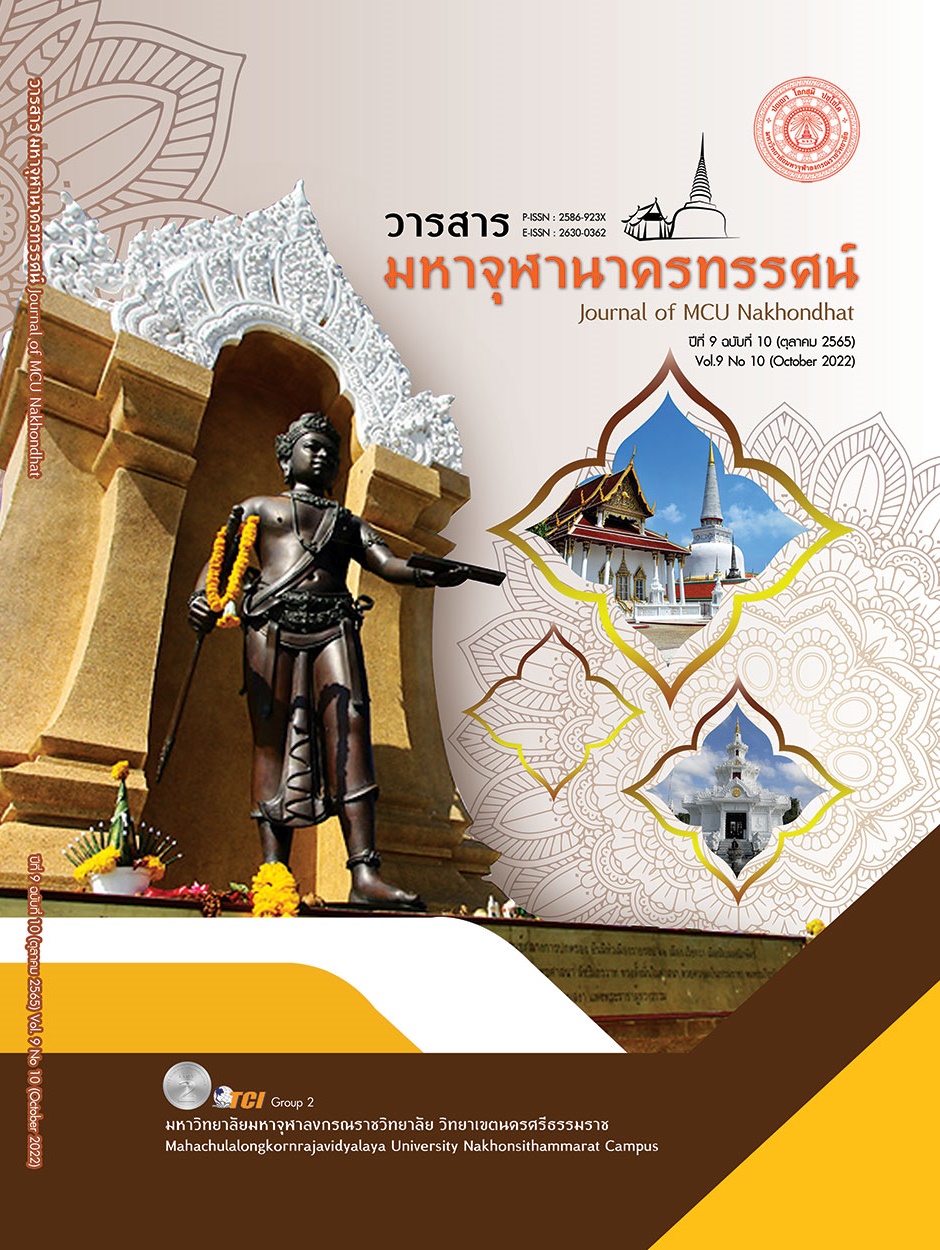PARTICIPATORY COMMUNITY MANAGEMENT TO SUPPORT AN AGING SOCIETY
Main Article Content
Abstract
This article discusses participatory community management to support an aging society by means of literature review and content analysis to propose a participatory community management approach as a base to support the elderly in the community by analyzing the elderly's data in order to create a community development plan that is more conducive to the elderly. There are community structure management and the management of the status of people in the community to facilitate the elderly. There are determining the roles of community members to support the lives of the elderly while creating community norms for the elderly and the adoption of laws relating to the elderly coupled with instilling the attitudes of people in the community to realize the value and respect the human dignity of the elderly. Meanwhile there are enhancing the community culture to support the elderly and develop healthy behaviors for the elderly by integrating the 4 Bhavana Dharma principles to manage the community in 4 parts, namely the physical management of the elderly community (Kaya Bhavana), social and environmental management for behavior development (Sila Bhavana), mental development (Citta Bhavana) and intellectual development (Panna Bhavana). This allows the community to manage themselves in a participative manner by creating a strategic plan on the elderly that is appropriate to the community context including also is a mechanism for participation in the care and promotion of the elderly in the community Data analysis of the elderly in the community Then make plans and community structures to be more conducive to the elderly. Managing the status and setting the roles of members in the community to facilitate the elderly with the creation of community norms. and preventing abuse of the elderly while instilling in the community to respect the human rights of the elderly Conducting activities to strengthen the community culture to support the elderly and jointly develop well-beings behaviors for the elderly.
Article Details

This work is licensed under a Creative Commons Attribution-NonCommercial-NoDerivatives 4.0 International License.
References
กรมการแพทย์ กระทรวงสาธารณสุข. (2560). ทิศกรมการแพทย์ 2560. บริษัท อาร์ตควอลิไฟท์ จำกัด.
กรมกิจการผู้สูงอายุ, (2565). ดูแลผู้สูงวัยอย่างไรให้สุขกายสบายใจ. เรียกใช้เมื่อ 15 กันยายน 2565 จาก https://www.dop.go.th/th/know/15/741.
กรมอนามัย กระทรวงสาธารณสุข. (2562). คู่มือแนวทางการขับเคลื่อนแผนปฏิบัติการการส่งเสริมสุขภาพผู้สูงอายุ กรมอนามัย ภายใต้แนวคิด “สุขเพียงพอ ชะลอชรา ชีวายืนยาว” ประจำปีงบประมาณ พ.ศ. 2563-2565. เรียกใช้เมื่อ 15 กันยายน 2565 จาก https://eh.anamai.moph.go.th/th/elderlymanual/download/?did=201584&id=64020&reload.
กระทรวงสาธารณสุข. (2557). แผนงานพัฒนาพฤติกรรมอนามัยส่งเสริมสุขภาพและป้องกันโรคเพื่อส่งเสริมสุขภาพตามกลุ่มอายุ. กรุงเทพมหานคร : กระทรวงสาธารณสุข.
กรุงเทพธุรกิจ. (2565). ผลกระทบของสังคมผู้สูงอายุของประเทศไทย. เรียกใช้เมื่อ 16 กันยายน 2565 จาก https://www.bangkokbiznews.com/blogs/columnist/ 116354.
จำนงค์ อดิวัฒนสิทธิ์. (2545). สังคมวิทยาตามแนวพุทธศาสตร์. กรุงเทพมหานคร : มหาจุฬาลงกรณ์ราชวิทยาลัย.
ฉัตรสุมน พฤฒิภิญโญ. (2564). กฎหมายที่เกี่ยวข้องกับผู้สูงอายุ. วารสารจุลนิติ. 18(3), 38-39.
ชัยพัฒน์ พุฒซ้อน และกันตพัฒน์ พรศิริวัชรสิน. (2561). วารสารเครือข่ายส่งเสริมการวิจัยทางมนุษยศาสตร์และสังคมศาสตร์. ปีที่ 1(1), 27.
นิยพรรณ (ผลวัฒนะ) วรรณศิริ. (2550). มานุษยวิทยาสังคมและวัฒนธรรม. กรุงเทพมหานคร : เอ็กซเปอร์เน็ท.
พระมหาสนอง ปัจโจปการี. (2556). มนุษย์กับสังคม. กรุงเทพมหานคร : สำนักพิมพ์แห่งจุฬาลงกรณ์มหาวิทยาลัย.
สุดา ภิรมย์แก้ว. (2544). มนุษย์กับสังคม. กรุงเทพมหานคร : มหาวิทยาลัยเกษตรศาสตร์.
สุพัตรา สุภาพ. (2536). สังคมและวัฒนธรรมไทย. กรุงเทพมหานคร : สำนักพิมพ์ไทยวัฒนาพานิช.


